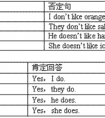Mike likes sports very much. He loves. [ ]A. to play the football B. playing the football C. to play footballD. playing football-七年级英语
一、动名词作主语
1. 直接位于句首做主语。例如:
Swimming is a good sport in summer.
2. 用 it 作形式主语,把动名词(真实主语)置于句尾作后置主语。
动名词做主语时,不太常用 it 作先行主语,多见于某些形容词及名词之后。例如:
It is no use telling him not to worry.
常见的能用于这种结构的形容词还有:better,wonderful,enjoyable,interesting,foolish,difficult,useless,senseless,worthwhile,等。
注意:important,essential,necessary 等形容词不能用于上述结构。
3. 用于“There be”结构中。例如:
There is no saying when he'll come.很难说他何时回来。
4. 用于布告形式的省略结构中。例如:
No smoking ( =No smoking is allowed (here) ). (禁止吸烟)
No parking. (禁止停车)
5. 动名词的复合结构作主语
当动名词有自己的逻辑主语时,常可以在前面加上一个名词或代词的所有格,构成动名词的复合结构
(这时,名词或代词的所有格做动名词的逻辑主语)。
动名词的复合结构也可以在句中作主语。例如:
Their coming to help was a great encouragement to us.
二、动名词作宾语
1.作动词的宾语
某些动词后出现非限定性动词时只能用动名词作宾语,不能用不定式。常见的此类动词有:
admit, appreciate, excuse, stand, advise, allow, permit, avoid, consider, enjoy, finish
They went on walking and never stopped talking.他们继续走,说个不停。
I found it pleasant walking along the seashore.在海滩上走真是乐事。
Mark often attempts to escape being fined whenever he breaks traffic regulations.
每当马克违反交通规则时,他常常企图逃避罚款的处分。
2.作介词的宾语
We are thinking of making a new plan for the next term. 我们正考虑为下学期制定新的计划。
Shall we have a rest or get down to doing our work? 我们休息呢还是开始干活?
3.作形容词的宾语
The music is well worth listening to more than once. 这种曲子很值得多听几遍。
We are busy preparing for the coming sports meet. 我们正为马上到来的运动会忙着做准备。
三、动名词作表语
动名词作表语时句子主语常是表示无生命的事物的名词或what引导的名词性从句。
表语、动名词与主语通常是对等的关系,表示主语的内容,主语、表语可互换位置。
Your task is cleaning the windows. 你的任务就是擦窗户。
(Cleaning the windows is your task.)
What I hate most is being laughed at. 我最痛恨的就是被别人嘲笑。
(Being laughed at is what I hate most.)
四、动名词作定语
动名词作定语往往表示被修饰词的某种用途。如:
a walking stick =a stick for walking=a stick which is used for walking
a washing machine=a machine for washing=a machine which is used for washing
a reading room=a room for reading=a room which is used for reading
a measuring tape=a tape for measuring=a tape which is used for measuring
sleeping pills=pills for sleeping=pills which is used for sleeping
动名词也有时态和语态的变化,如表所示(以及物动词write为例),不及物动词没有语态的变化。
| 时态、语态 | 主动 | 被动 |
| 一般式 | writing | being written |
| 完成式 having written |
having been written |
1) 动名词做主语时,谓语动词为单数
2) 在动名词和不定式中,作为介词的宾语是动名词
3) 动名词的否定直接在其前加否定词,通过代词的宾格或所有格形式给出逻辑主语
例:I would appreciate you calling back this afternoon.
4) 有些词后只能接动名词
acknowledge;admit; advise;advocate;allow;appreciate; avoid; celebrate; consider; contemplate; defer; delay; deny;
detest; discontinue; dislike; dispute; enjoy; it entails; escape; excuse; explain; fancy; feel like; finish; forgive; can’t help;
hinder; imagine; it involves; keep; it means; mention; mind; miss; it necessitates; pardon; postpone; practice; prevent;
recall; report; resent; resist; risk; suggest; understand...
5) 另外还有一些接-ing形式的常用说法
it’s no good; it’s no/little/hardly any/ use; it’s not/hardly/scarcely use; it’s worthwhile; spend money/time; there’s no;
there’s no point in; there’s nothing worse than; what’s the use/point
6) 有些词后面加不定式和动名词均可
remember,forget,try,stop,go on,continue,stop,regret,cease,mean后面均可用不定式和-ing形式,但意义截然不容。
例:remember to do/doing:
①I remembered to post the letters.(指未来/过去未来将要做的动作)
②I remembered posting/having posted the letters.(我记得做过这个动作)
forget与remember的用法类似。
regret的用法:
①I regret to inform you that…(我很遗憾地通知你……)
②I regretted having left the firm after twenty years.(为了“二十年前的离开”而遗憾。)
try to(努力)与try +–ing(试验):
①You really must try to overcome your shyness.
②Try practicing five hours a day.
考点名称:零冠词
- 零冠词:
是指名词前面没有不定冠词(a、an)、定冠词(the),也没有其他限定词的现象。零冠词也是冠词的一种。
例如:
This is my book.
Bread is made from flour.
Let's go and play basketball.
He is head of the factory.
注意:有些名词前用the,或不用the,其意义有所不同。例如:
go to school 上学
go to the school 到学校去
in future 今后,将来
in the future 将来 零冠词的用法:
1.表示抽象概括意义时,不可数名词和复数名词使用零冠词,例如:
(/)Books are my best friends.书是我的好朋友。
(/)Cotton feels soft.棉花摸起来柔软。
(/)Water boils at 100℃.水在摄氏100度沸腾。
比较:The water in this river is undrinkable.这条河的水不可饮用。
2.专有名词通常使用零冠词,例如:
(/)Lu Xun is a great Chinese writer.鲁迅是一位伟大的中国作家。
(/)London is the capital of England.伦敦是英国的首都。
(/)China is a developing socialist country.中国是一个发展中的社会主义国家。
(注意:组合国名或缩写国名前加定冠词,如:the United States 美国;the U.K 英国)
3.按照习惯下列各类名词使用零冠词:
1)季节、月份、星期以及节假日(中国传统节日除外,详细请查阅“定冠词”)等名词前,例:
(/)Summer begins in June in this part of the country.这个地区夏天从六月份开始。
We have no classes on(/) Sunday.星期日我们不上课。
There are a lot of (/)people shopping at (/)Christmas.在圣诞节有很多人购买东西。
2)三餐饭菜的名词,例:
have (/)supper 吃晚饭
come to (/)dinner 去吃饭
3)语言、运动、游戏等名词,例:
She speaks (/)Chinese.她说汉语。
He plays (/)football.他踢足球。
Let’s have a game of (/)chess.咱俩下盘棋吧。
4)在某些意义有改变的名词前要使用零冠词,例:
He has gone to (/)school.(to learn)他去上学了。
They were in (/)church just now.(to worship)现在他们在做礼拜。
同样, in hospital是“住院(治疗)”,in prison是“服刑”,等等。
注意:如果在这类名词前加冠词,则表示去那里干与之无关的事,例:
go to the school 可理解为去学校看望人,而不是“学习”。
4.在表示职位、头衔、身份等名词前,例:
(/)Professor Wang 王教授
(/)Doctor Tompson 汤普生医生
(/)President Lincoln 林肯总统
(/)Dean of the English Department 英语系主任
5.泛指的复数名词,表示一类人或事物时,可不用定冠词(泛指的复数名词非零冠词):
They are teachers. 他们是教师。
- 最新内容
- 相关内容
- 网友推荐
- 图文推荐
| [家长教育] 孩子为什么会和父母感情疏离? (2019-07-14) |
| [教师分享] 给远方姐姐的一封信 (2018-11-07) |
| [教师分享] 伸缩门 (2018-11-07) |
| [教师分享] 回家乡 (2018-11-07) |
| [教师分享] 是风味也是人间 (2018-11-07) |
| [教师分享] 一句格言的启示 (2018-11-07) |
| [教师分享] 无规矩不成方圆 (2018-11-07) |
| [教师分享] 第十届全国教育名家论坛有感(二) (2018-11-07) |
| [教师分享] 贪玩的小狗 (2018-11-07) |
| [教师分享] 未命名文章 (2018-11-07) |

![Which of the following can you probably see in the meeting room? [ ]A. B. C.D. -七年级英语](http://www.00-edu.com/d/file/ks/4/2/dongmingci/2020-01-08/small97361980a56115e1c9237567439904fe1578422951.jpg)

![—Can the boy finish_____ the book in about a week? —I think he can. [ ]A. read B. reading C. to read D. reads -八年级英语](http://www.00-edu.com/d/file/ks/4/2/dongmingci/2020-01-08/smallfa4d713075e249356362fe7392193a301578421751.png)


